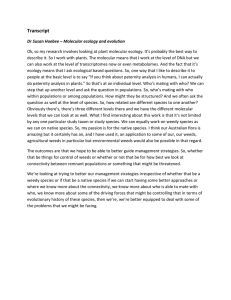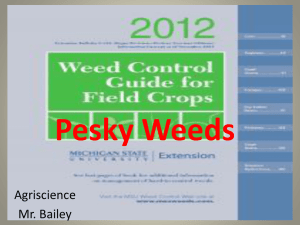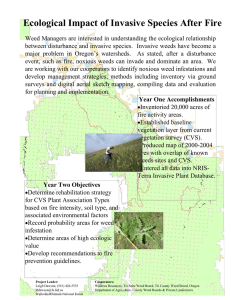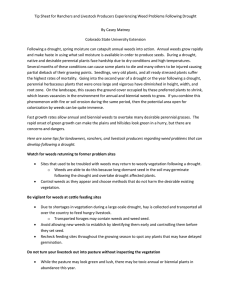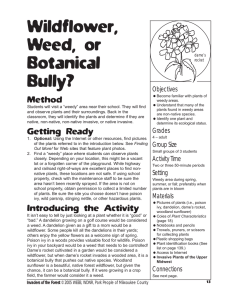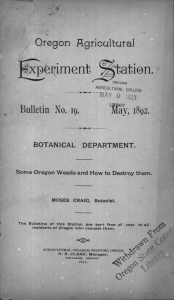Experirr?ent St tk. OTN DEPARTMENT 01
advertisement
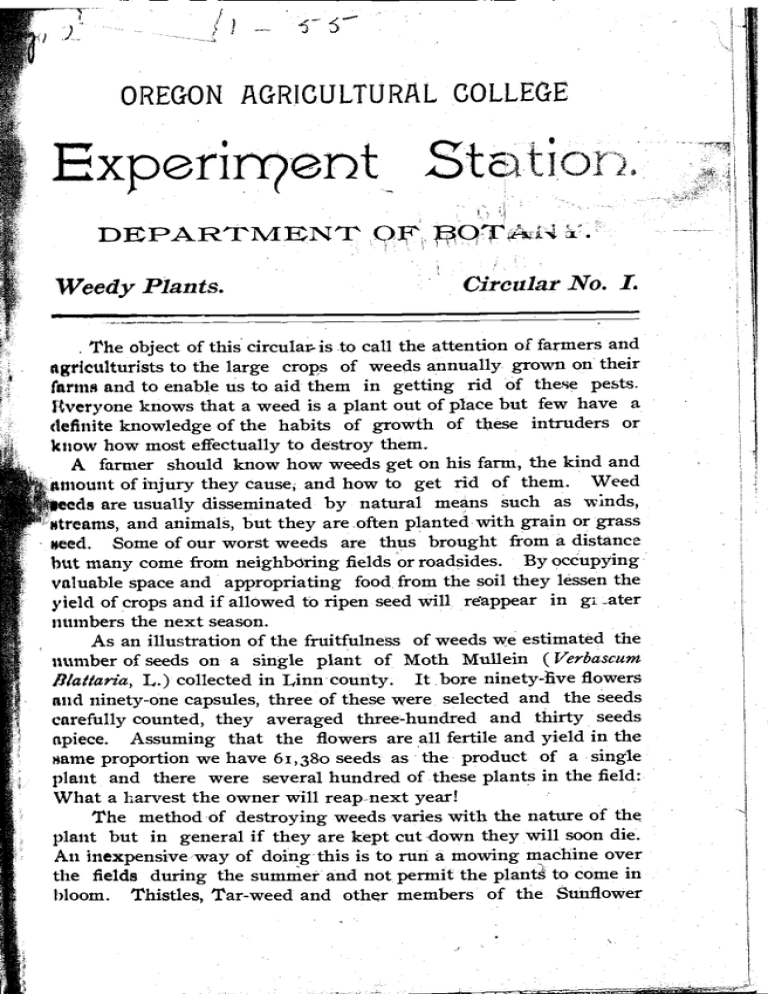
OREGON AGRICULTURPW COLLEGE Experirr?ent St DEPARTMENT 01 Weedy Plants. tk. OTN . Circular No. I. The object of this circular- is to call the attention of farmers and agrlculturists to the large crops of weeds annually grown on their farms and to enable us to aid them in getting rid of these pests. I tveryone knows that a weed is a plant out of place but few have a definite knowledge of the habits of growth of these intruders or lcnow how most effectually to destroy them. A farmer should know how weeds get on his farm, the kind, and amount of injury they cause, and how to get rid of them. Weed jeeds are usually disseminated by natural means such as winds, streams, and animals, but they are often planted with grain or grass seed. Some of our worst weeds are thus brought from a distance hut many come from neighboring fields or roadsides. By occupying valuable space and appropriating food from the soil they lessen the yield of crops and if allowed to ripen seed will reappear in gI Water numbers the next season. As an illustration of the fruitfulness of weeds we estimated the number of seeds on a single plant of Moth Mullein (Verbascum Dial/aria, L.) collected in Linn county. It bore ninety-Eve flowers and ninety-one capsules, three of these were selected and the seeds carefully counted, they averaged three-hundred and thirty seeds apiece. Assuming that the flowers are all fertile and yield in the same proportion we have 6x ,38o seeds as the product of a single plant and there were several hundred of these plants in the field: What a harvest the owner will reap-next year! The method of destroying weeds varies with the nature of the I)lallt but in general if they are kept cut -down they will soon die. An inexpensiveway of doingthis is to run a mowing machine over the fields during the summer and not permit the plant to come in bloom. Thistles, Tar-weed and other members of the Sunflower family if cut while in bloom should be burned immediately else the ,9seed will ripen on the ground aiid be distributed by the wind. It is much easier to prevent the introduction of weeds than to destroy them when thoroughly established so great care should always be taken to sow clean seed, the extra expense will be more than repaid by the increased volume of the crop. In order to learn what Oregon plants are most mjunous we have prepared a number of questions and desire the co-operation of all interested in the ivOik of dJetroying weedy plants. We ask that each farmer and agriculturist in the state (this means you) answer these questions as fully as possble with notes on the abundance, distribution and properties of poisonous or weedy plants. You will receive in return through the Station bulletins the benefit of the observations and experience of all the farmers in the state. The information thus obtained will be used in the preparation of an illustrated bulletin containing a classified list of the weedy plants of the state with the best method for destroying them, also a short history and popular description of each so you will have no difficul and can destroy them ty in reCognizing the worst weeds at sight enough to cause serious trouble before they become abundant established for your benefit Remember that the Station was informat on concernir g plants grow and if at any time you desire glad to answer plant d1sease, we will be ing on your farm, or any Questions about plants should your questions as fully as possible what that we may know just be accompanied by specimens so plant is meant The specimens should be complete, that is they should include of the root, the flowers, fruit, leaves and if herbaceous a portion different from the stem leaves so both often the root leaves are each species should be sent Number the specimens, wrapping and unsealed package with your name separately, and send in an which address on the outside, the postage is one cent an ounce In musk be fully prepaid or the package will not be forwarded collection and the accompanying letter state the date and place of whether the plant is considered medicinal, poisonous or weedy, with any other information you consider of interest to plants to Moses Address all communications relating -- Craig, BOTANIST EXPERIMENT STA1'IoN, CORVALLIS, OREGON spaces Tear off the annexed sheet, fill out the blankEXPERI- and return it in enclosed envelope to BOTANIST, MENT STATION, Corvallis, Oregon. Name Post Office, county, What are the worst weeds groing upon your farm and roadsides? Name them in order of badness, beginning with. tbe worst, and in ease of doubt as to name or propertis send specimens.. 2. What is the character of the soil Do . .What means -do.. you take to destroy your weed 'crop? you cut and burn them or.. do you compost -them? With:what result? 4. What weedy plants if any do you use for fodder :an4 for what animals? Do you consider them of much value? What new weeds have you noticed on your farm lately? Do they spread rapidly or do much damage? What medicinal or poisonous plants grow on your farm? State some of their properties. Underline all of the following weeds that now grow on your Place a question mark after the name of any plant that you do not know Tarweed, Madia g-lomerala, Ilk. Wild Oats, Avenafa/ua, L. Dog's Iennel or May-weed, Anthemis Co/ida, DC. Canada Thistle, Cnicus arvensis, Hoffm. farm. Chess or Cheat-grass, Bromus secalmnus, L. Common Brake or Fern, P/ens aquilina, L. Field or Sheep Sorrel, Rumex Ace/osella, L. Bull Thistle, cnicus lanceolatus, Hoffm. Ribgrass or Narrow-leaved Plantain, Plan/ago lanceolala1 L. Bluebottle, French Pink, Cornbloom, Cen/aurea Cyanus, L. Os-eye or White Daisy, Chrysanthemum Leucanthemum, L. Moth Mullein, Verbascum Blat/aria, L. Pepper-weed, Gilia .cquarrosa, Hk. and Am. Burdock, Aclium Lappa, L. Common Mullein, Verba scum 7'haj'sus, L. Wild Mustard, Brassica campes/ris, L.
